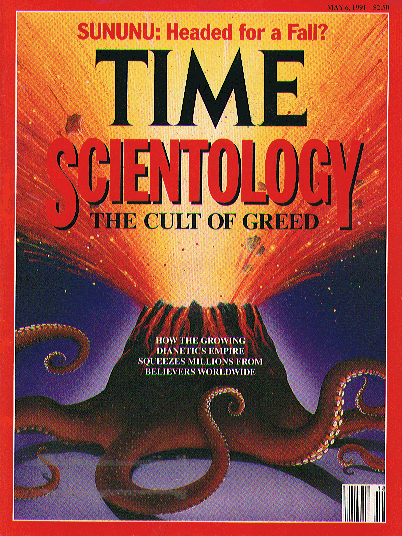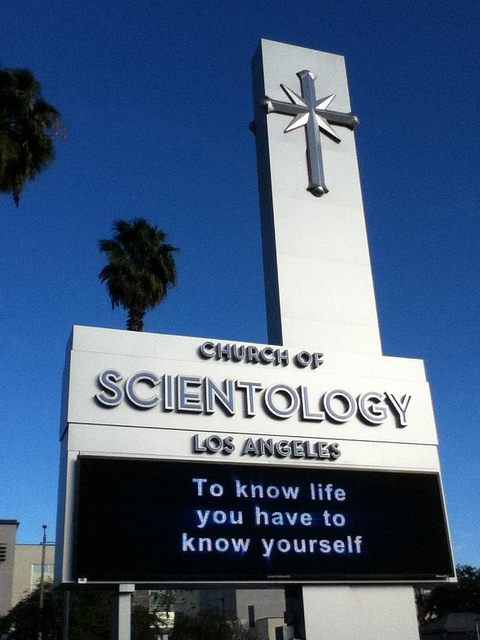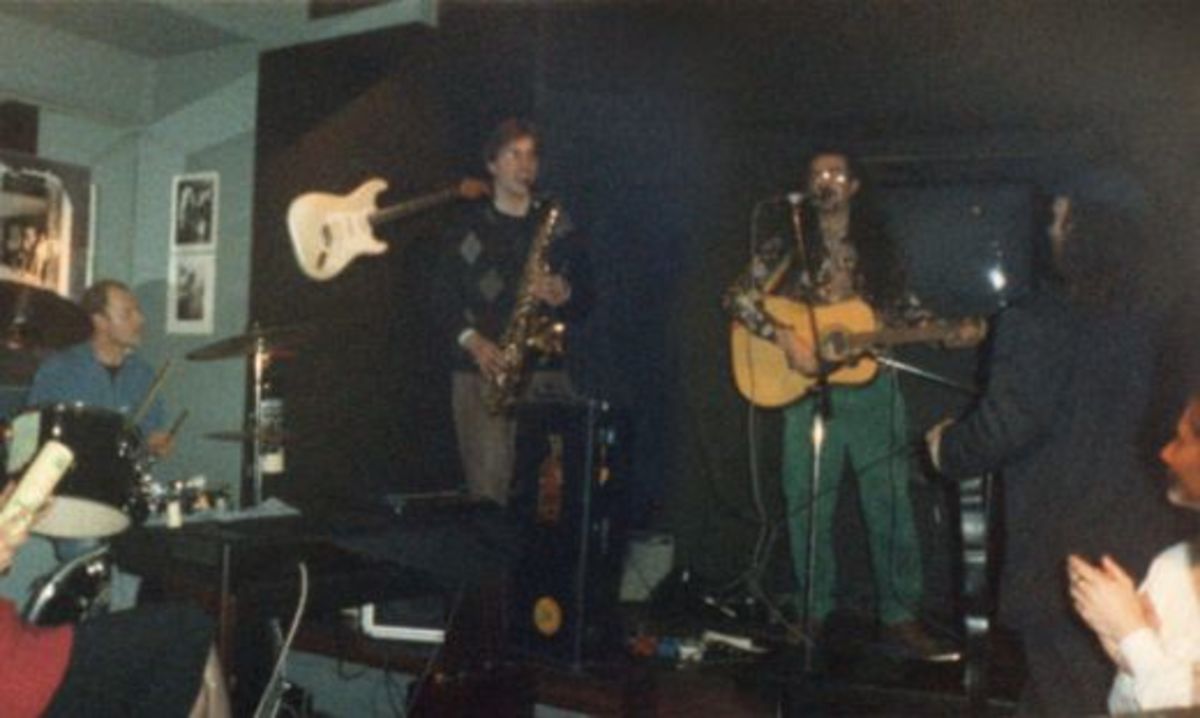The Secret World of Scientology
When it comes to Scientology, there are more questions than answers.
Is it a cult or a religion (or as followers claim, a "technology")?
Do Scientologists worship aliens?
Is it really dangerous or is it deliberately demonized by the media to keep the people in ignorance?
Finally, what's so special about Scientology that attracts celebrities and people with power? This article gives you a tantalizing glimpse into the secret world of Scientology.
The term Scientology is taken from the Latin word “scio” (meaning: full knowledge, complete knowing) and the Greek word "logos" (word, divine reason, message). So the term can be interpreted as "the message of full knowledge". The official definition is “the study of truth”.

Who is L. Ron Hubbard?
To some L. Ron Hubbard (a.k.a. "LRH") was a visionary, a prophet, a messiah sent from heaven to deliver the next new testament. To others he was a madman, a charlatan, a black magician, or just a troubled man with delusions of grandeur.
Not many facts about Hubbard's life are indisputable.
Any "official" biography will tell you that Lafayette Ronald Hubbard was born in 1911 in Tilden, Nebraska. He traveled throughout Asia and the Pacific examining Eastern philosophies. He studied the ways of the primitive villages of Martinique in the Caribbean, the esoteric beliefs of Haiti, the culture of the Puerto Rican hill people, and many others. His research eventually led to the discovery of Dianetics - Hubbard's "Bible" that outlined the philosophy and techniques of the future Church of Scientology. L. Ron departed his physical form on January 24, 1986, presumably to continue his work on another planet.
However, as evident from unofficial biographies and witness testimonies, Hubbard's story contains numerous idiosyncrasies, weird facts and gray areas. His involvement with occultism, for example, or blackmailing the followers who wanted to leave the church, or false claims to cure any mental or physical ailment.
This is how occultist John (Jack) Parsons describes him:
[Hubbard] is a gentleman; he has red hair, green eyes, is honest and intelligent, and we have become great friends. <...> Although he has no formal training in Magick, he has an extraordinary amount of experience and understanding in the field. From some of his experiences I deduced that he is in direct touch with some higher intelligence, possibly his Guardian Angel.

From Science Fiction to Religion
The founder of Scientology started out as a science fiction writer.
And not just any writer - he is one of the most prolific fiction writers in history. He holds the Guinness World Record as the most published author with over a thousand works. But writing didn't satisfy his ambition. He was famously quoted as saying:
"Writing for a penny a word is ridiculous. If a man really wants to make a million dollars, the best way would be to start his own religion."
Hubbard did make a million dollars, and then some. The Church of Scientology is notorious for its high prices. Members pay thousands, sometimes hundreds of thousands of dollars in membership fees to progress through the church's elaborate hierarchy. It's not enough to just be a Scientologist: members are expected to reach for new higher (read: more expensive) levels, or their souls are in danger. LRH also used his organization's funds as his personal piggy bank.
Nonetheless, many people were perfectly willing to pay large sums of money to attend his training seminars. Why?
First, it was Hubbard's immense charisma. This is the one thing that comes through in all the biographies and witness accounts.
And second, it was the teaching itself. Hubbard's doctrine, although esoteric and full of confusing terminology, promises everything we all desire: to become "clear" of physical and psychological ailments that hold us back, and to realize our fullest potential.

Scientology's Secret Spiritual Technology
“Dianetics: the Modern Science of Mental Health” was published in 1950. The principles outlined in “Dianetics” formed the basis of the religious philosophy known as Scientology.
“The basic discovery of Dianetics was the exact anatomy of the human mind,” Hubbard wrote.
It is said that through the application of the technologies discovered by L. Ron Hubbard adverts can bring about positive changes in their lives, raise personal ability and understanding, and become free of the negative “reactive mind”.
That may sound like self-help psychology, but Hubbard was adamant about the fact that Scientology and psychology have nothing in common. In fact, his hatred for psychology (and psychiatry) is legendary. He said that psychology, a study of the spirit ("psyche" is a Greek word meaning spirit), has become “study of the spirit which denied the spirit.”
Unlike psychology and psychiatry, Scientology is meant to help people achieve concrete goals, discover their true (spiritual) identity, and improve their lives in a way never thought to be possible - all with an exact application of the knowledge and the techniques delivered by L. Ron Hubbard.

Is Scientology...
Basic Principles of Scientology
The basic principles of Scientology (as outlined in Hubbard’s book “Scientology: the Fundamentals of Thought”) are as follows.
- There are 3 conditions of existence in life: be, do and have. Each one expresses a state of being assumed to be critical to one’s identity.
- There are 8 urges (drives) in life called dynamics. They all have to do with survival, and they are: the urge to be oneself, the urge towards sexual activity, the urge towards being part of a group, the urge to be part of the human race, the urge towards existence as part of the animal kingdom, the urge towards existence as the physical universe, the urge towards existence as spirits, and the urge towards existence as infinity (God). Actions that support survival are good; those that impede survival are evil.
- The ARC Triangle, which is the blueprint to all of life’s activities. The corners of the triangle are affinity, reality and communication. Of the three, communication is the most important one.
- Life is a game. So the reasons to live are the same as the reasons to play a game: interest, contest, activity and possession.
- An individual can be divided into 3 parts: the spirit (called Thetan in Scientology), the mind, and the body.
"A thetan is the person himself – not his body or his name, the physical universe, his mind, or anything else; that which is aware of being aware; the identity which IS the individual. The thetan is most familiar to one and all as you.” (R. Hubbard)
- A man is a spiritual being with vast potential. Official Scientology website says that
"[A man] is not only able to solve his own problems, accomplish his goals and gain lasting happiness, but also to achieve new states of awareness he may never have dreamed possible."
- The mind has 3 main divisions: analytical mind, reactive mind and somatic mind.
Reactive Mind, Engrams and Auditing
"Reactive mind" is a very important term in Scientology. It's akin to what we know as "the subconscious" or the reptilian brain that operates through a stimulus-response mechanism.
All bad experiences are stored in the reactive mind as "engrams" that later in life cause physical and psychological issues. Scientologists believe that all illnesses can be "cleared" through a process called "auditing"(which can be described as a mixture of psychotherapy and the Catholic confession).
An auditor asks a person being audited ("preclear") a series of intimate questions (as part of the Sexual and Criminal Security Check) while they hold on to an E-meter (glorified lie detector). Some questions are asked repeatedly, such as "Have you done anything your mother would be ashamed to find out?" The confessions are then kept by the Scientology organization and, as some whistle-blowers claim, are used to blackmail the members who wish to leave the Church.

South Park created an animated version of the story of Xenu
Scientology and Aliens
Perhaps, the most controversial aspect of the Scientology belief system is the alleged belief in Xenu. So who is Xenu?
Xenu is an intergalactic warrior who brought billions of people to Earth 75 million years ago, killed them, and (this is where it gets complicated) the souls of these people formed into clusters that attach to other humans and continue to perpetuate themselves. This is known as "Incident II", implanted deep in our memory. "The original sin" of sorts. But worry not - the Church can remove them.
High-ranking Scientologists routinely deny such beliefs. However, in 2008 WikiLeaks released what is known as Scientology's bible - a 612-page document detailing eight different Operating Thetan levels, along with 'Xenu, Implanters/Implant Stations and other galaxies and such.' Not long after, in 2009 a Scientology spokesman Tommy Davis, when pressed in an interview, confirmed that the Xenu story is true, but is only revealed when an initiate reaches "Operating Thetan Level III".
All in all, Xenu considerably damaged Scientology's public image, even though the church has gone to great lengths to keep the space despot on the DL, including legal action. To this day the official position remains that
"Scientology holds no such belief. Any suggestion otherwise is as absurd as asserting that those of the Christian faith believe themselves descended from aliens because they believe there is a Heaven.”

There are Scientology Celebrity Centres in Hollywood, Paris, Vienna, Düsseldorf, Munich, Florence, London, New York, Las Vegas, and Nashville.
What’s the Appeal of Scientology?
The high cost of Scientology makes it somewhat unappealing to the proverbial "average Joe". But if you're a loaded celebrity who's looking to add a little spice to your public profile, Scientology is for you!
The church has special Celebrity Centers all over the world dedicated to catering to the celebrities' every need: private counseling, private study areas, upscale gym, luxury accommodations and other perks "regular" members don't get.
As the Church of Scientology Celebrity Centre's webpage says,
"the artists, politicians, leaders of industry, sports figures and anyone with the power and vision to create a better world" face unusual pressures associated with having a high profile, so "there’s no shame in helping the artist".
Although there are only a few celebrity scientologists, their role is considered to be central in attracting new recruits. LRH recognized early on that celebrities make the best advocates because they are "walking success stories".
On the other hand, celebrities, too, are people, and they may be looking to "spiritualize" their lives, to feel validated and connected in a meaningful way. Scientology gives them an opportunity to do that at a luxurious 5-star resort.
Scientology offers people answers. It offers certainty in the world of perpetual uncertainty and chaos.
It offers purpose and direction to those who've become cynical after years of soul searching.
Best of all, Scientology offers a clear path. A path of happiness and spiritual enlightenment available to all members of the church, provided they are willing to spend their life savings.
© 2014 Lana Adler








